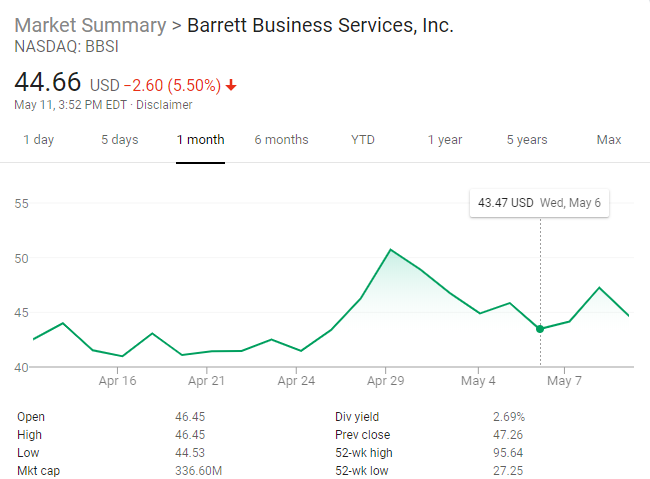Disclaimer: this article is independent commentary on BBSI’s recent earnings release on May 6th. All statistical information contained within this article is public knowledge. The information contained within this article should not be construed as investment advice. As with any investments, material risks should be evaluated prior to investing. The commentary section of this article is solely the opinion of the author and should not be construed as advice.
Opening
Recently discussed in our article titled PEO Industry Statistics 2019 – Part 2, we discussed the potential impact of COVID-19 on the PEO industry. As outlined in the Growth Outlook section of that article, we noted Barrett Business Services, Inc. (BBSI) as the third of the major players, and the first of the blue-collar centric PEOs to have their earnings release for Q1 of 2020 (TriNet was the first to release earnings (results found here) and Insperity was the second to release earnings (results found here). While Q1 encapsulated only a small duration of the quarantine, we look to publicly traded PEOs for some insight into the effect of the shutdown on PEO financials.
Fast Facts
BBSI missed analysts’ forecasts for Q1, both from an earnings per share (EPS) and revenue perspective. The expected EPS for Q1 was -$0.26. BBSI reported an EPS of -$0.54, equating to a negative surprise of -102.64%. Expected revenue for the quarter was $228.4m. BBSI reported revenue at $219.1m, equating to a negative surprise of -4.07%.
Material Information/Comments from the Earnings Call
The following insights were pulled from BBSI’s earnings release call on May 6th, 2020.
Financial Strength
Gary Kramer, CEO of BBSI, stated that the company is in a position of strength from a cash perspective. BBSI has $94m cash with an additional $50m in the form of an LOC from Wells Fargo. The company had begun a stock repurchase program but has suspended this due to COVID-19.
New Business and Attrition
Kramer stated that BBSI added 403 new clients in the quarter while loosing 181, equating to a net gain of 222 new clients.
Impact of COVID-19 on April Financials (Q2 update)
Kramer went on to state that BBSI’s client portfolio is heavily skewed toward blue- and grey-collar business. He further commented on the reduction in gross billing the clients are experiencing and segmented these reductions into three categories; minimally affected, moderately affected, and severely affected.
Minimally affected clients (18% of all gross billings) experienced no reduction up to a 7% reduction in April. These clients would include SMBs in waste management, landscaping, janitorial, and maintenance. Moderately affected clientele (65% of all gross billing) experienced a 7% to 15% reduction in April. These clients would include contractors, construction, transportation, logistics, and manufacturing. Severely affected clients (17% of all gross billing) have experienced between a 15% and 50% reduction. These clients would include restaurants, hospital staff, retail and wholesale trades, and professional services (i.e. dentists, etc.). Overall, the company has experienced an 16% reduction in gross billings for April (California was slightly higher for BBSI at 18%).
Furloughs, Layoffs, Consolidation
BBSI has laid off 8% of its workforce and has furloughed another 9%, accounting for a reduction in staff, of 17% currently. The company has also combined 6 branches to reduce overhead and turned some locations into satellite operations.
Strategic Moves
BBSI is currently licensed as a PEO in 20 states. Kramer stated that they are in process of getting licensed in all states and expects this to be completed within four months. He further explained that he believes this to be a driver for growth post COVID-19.
Additionally, BBSI is rolling out a new technology platform, which they expect to be ready for new clients in June. They plan on migrating all clients to this new platform by the end of 2020. Kramer also believes that this new platform will contribute to future growth post COVID-19.
Finally, the company appeared to be more open to strategic acquisitions, which is a pivot from their predominant organic growth strategy in the past.
Q1 Financial Highlights
Anthony Harris, BBSI’s CFO, state that the company posted a net loss of $3.4m in Q1, compared with a loss of $2.3m in the same quarter for 2019. He also stated that January and February were up 8% year over year, prior to the affects of COVID-19 in March, which subsequently grew by only 1.5%. The total growth year over year equated to 5.8% for the quarter.
BBSI’s staffing segment declined to $25.5m from $27.7m from the prior year. Additionally, the company stated that staffing revenues are down 35% in April. BBSI’s net revenue came in at $219.1m, up slightly from Q1 in 2019 but below analysts’ forecast for Q1 of 2020.
Workers’ Compensation
BBSI’s claims frequency has declined by 18% compared to Q1 of 2019 and the company expects these levels to continue. Moreover, Kramer stated that less than 2% of their business would be considered “first responders” and therefore they do not believe they will have a material uptick in workers’ compensation claims related to COVID-19. He further opined that due to the government stimulus package of $600 per week, laid off employees are making more on unemployment than they would in the workers’ compensation system.
Annual Forecasts and Guidance
BBSI withdrew any formal annual guidance as a result of COVID-19. However, Kramer did state that they believe they will be profitable in Q2 and for the full year’s outlook.
BBSI Stock Trending

About BBSI
BBSI (NASDAQ: BBSI) is a leading provider of business management solutions, combining human resource outsourcing and professional management consulting to create a unique operational platform that differentiates it from competitors. The Company’s integrated platform is built upon expertise in payroll processing, employee benefits, workers’ compensation coverage, risk management and workplace safety programs, and human resource administration. BBSI’s partnerships help businesses of all sizes improve the efficiency of their operations. The Company works with more than 7,200 clients across all lines of business in 29 states. | www.mybbsi.com.
Independent Commentary by Rob Comeau
Rob Comeau is the featured Author of www.netprofitgrowth.com
We expected BBSI to take a hit as a result of COVID-19 due to their macro client segmentation being heavily in blue- and grey-collar industries. The company reduced its current headcount by 17%, almost half of which was permanent. Further, the majority of these reductions occurred within the field risk management function of the company. It will be interesting to see if or how this will impact future workers’ compensation results over the next 12 to 18 months.
BBSI stated it is in a strong financial position with $94m in cash and another $50m in an LOC. However, it still laid off and furloughed a material portion of its workforce. It appears that BBSI is being fiscally responsible, but it will be interesting to see if some of these layoffs were strategic in nature considering the company’s cash position. The company is currently saving approximately $140K weekly as a result of the layoffs and roughly the same as a result of the furloughs. To put this in perspective, the layoffs account for an annual savings of $7.3m to the company.
It appears like a smart move by BBSI to improve upon its technology platform, increase its licensing, and consider strategic acquisitions. These moves should bode well for the company’s growth post COVID-19. Moreover, the company has historically been a western US dominant platform. Increasing its geographic presence could have a material affect on offsetting workers’ compensation risk through growth in less volatile states than California.
It is likely, depending on the duration of sheltering in place, that BBSI will continue to experience reductions. However, once the economy begins to normalize, the company may be better positioned for growth due to its strategic moves. The outlier for future profitability may be workers’ compensation, if the field risk management reductions impact future claims frequency. Currently, the company’s claims frequency is down. Time will tell if the reductions have a material effect on future claims frequency.
BBSI’s April reduction in gross billings of 16% are in the middle of our recent projections for the impact of COVID-19 on the PEO industry, as outlined in the Growth Outlook commentary section of our PEO Industry Statistics Article.
In the commentary of that article, we provided guidance into the likely reductions PEO may face as a result of COVID-19. BBSI’s results and guidance were in the mid-range (for April) of our predictions with reductions, as illustrated in the Industry Revenues section of that article.
Excerpt from our Industry Statistics Article
Industry revenues are down year to date in 2020. While we don’t have specific statistics on these numbers to date, every conversation I’ve had with various PEO ownership teams state that revenues are down between 10% and 30%. Depending on the macro client segmentation, certain PEOs have been affected more than others. Blue-collar centric PEOs have likely felt the greatest hit as many of their clients are not currently operating. Grey-collar focused PEOs have felt the hit as well, especially those focused on hospitality. White-collar focused PEOs have experienced a dip, though likely not as great as blue- and grey-collar PEOs. Furloughs and layoffs will be drivers to a reduced year over year revenue change in 2020. The duration for how long the pandemic lasts will determine the severity of revenue reduction for the industry. Considering that roughly two-thirds of the industry’s macro client segmentation is contained within white-collar centric businesses, the industry may weather the storm slightly better than some other human capital industries.
Author
Rob Comeau is the CEO of Business Resource Center, Inc., a business consulting and M&A advisory firm to the PEO industry. Rob is the featured Author and Founder of this PEO online publication. To contact Rob, you may email him at rob.comeau@biz-rc.com. You may view Business Resource Center’s offering at www.biz-rc.com.

